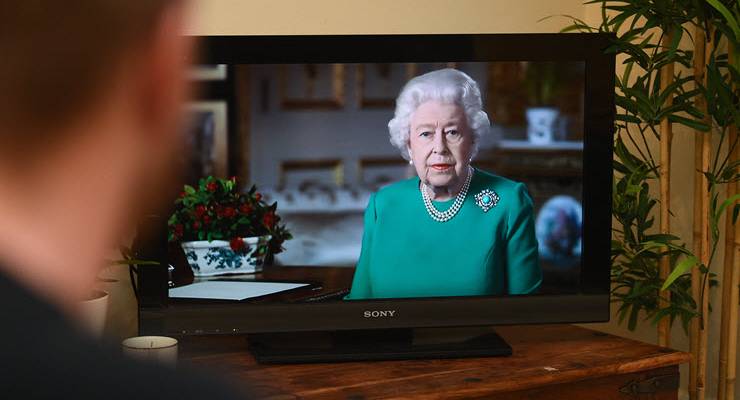
Donning her signature pearls and coiffed white hair, Queen Elizabeth made a rare national address early this morning, inspiring the colonies to unite and overcome coronavirus.
“The pride in who we are is not a part of our past, it defines our present and our future,” she said.
It’s rhetoric which invokes the feeling of wartime — it’s just the fourth televised speech in response to current events the Queen has made during her 68-year reign (outside her annual Christmas message).
The coronavirus pandemic has created a strange sense of support for governance and nations. Major leaders have seen their approval ratings surge in recent weeks — while others have not been so lucky.
Crikey takes a look at outliers and unconventional approaches.
Sweden
Self-responsibility is the approach of the Swedish government, with a hands-off approach focusing on guidance instead of strict rules.
In a televised address to the nation, Prime Minister Stefan Löfven told Sweden: “We who are adults need to be exactly that: adults. Not spread panic or rumours”.
Most Stockholmers are working from home and public transport passenger numbers have halved, though people still go out for happy hour drinks and window-shop.
Swedes are fans of this approach too, it seems. The percentage of voters who say they trust Löfven shot up from 26% to 44% since February, despite infections climbing to nearly 7000 confirmed cases with more than 400 deaths.
The Netherlands
The Dutch initially went hard on the “herd immunity” approach, before backtracking and saying group immunity would be a side effect of their strategy to flatten the curve.
They’re aiming for targeted or “intelligent” lockdown, with businesses to stay open unless they require touching, such as hairdressers.
Prime Minister Mark Rutte similarly went against the notion of a nanny-state, describing The Netherlands as a “grown-up country”.
Cases have skyrocketed to almost 18,000, with nearly 1800 deaths. But polling shows support for Rutte keeps climbing, with his party standing stronger than it has in more than two years.
Brazil
While a hands-off approach bolsters popularity in Europe, denial from Brazillian officials is having the opposite effect.
Brazil is Latin America’s worst-hit country with more than 11,281 coronavirus cases and nearly 500 deaths.
President Jair Bolsonaro has dismissed COVID-19 as a “little flu,” saying locals had immunity because they were used to jumping in sewage. His social media posts about coronavirus have been removed because they spread disinformation.
His lies are effecting his popularity: A survey from polling institute Datafolha found support for Bolsonaro fell from 35% to 33%, with disapproval increasing from 33 to 39% over the past two weeks.
But not everyone has a problem with the government. Health Minister Luiz Henrique Mandetta has seen his approval rating soar to 76% as he urges Brazilians to social distance (with Bolsonaro threatening to sack Mandetta for his contradictions).
Argentina
Next door in Argentina, draconian measures have been winning over the population with strict quarantines in place. Support for President Alberto Fernández has hit 87%.
Japan
Japan was slow to react to the coronavirus outbreak, despite the country’s proximity to China. An announcement to postpone the Tokyo Olympics was only made on March 25, with a state of emergency only declared today.
While cases are relatively low, this is most likely due to limited testing, with experts worried a crisis looms in Tokyo.
Prime Minister Shinzo Abe hasn’t enjoyed the surge in support other countries have: as of late March, he had a 55% disapproval rating.
Turkey
Turkish President Recep Tayyip Erdogan is not one to shy away from crises and controversy to bolster his popularity.
But the coronavirus crisis has had the opposite effect, with voters turning away from their leader.
Erdogan’s job approval rating fell to 41.1% by early March, with his support dropping as the economy slows.
Turkey has recorded one of the steepest trajectories of new cases in the world as Erdogan resists a full lockdown.








hRH channeling Vera Lynne, till we meet again